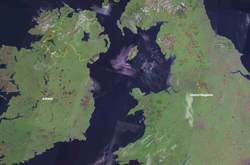Irish Sea
The Irish Sea (sometimes called the Manx Sea) is a body of water that separates Ireland and Great Britain. It is known to be one of the most polluted seas in the world including the North Sea and the Mediterranean Sea. The sea is important to regional trade, shipping and fishing. It is a source of power generation in the form of wind power and nuclear plants. Annual traffic between Great Britain and Ireland amounts to over 12 million passengers and 17 million tonnes (17,000,000 long tons; 19,000,000 short tons) of traded goods.

Economics change
It covers 17,374 square miles (45,000 km2) and at its deepest point is 300 metres (980 ft) deep.[1] In 2008, about 38 million tonnes (37,000,000 long tons; 42,000,000 short tons) of fish were caught.[1] Shell fish made up three quarters of this amount.
The Irish Sea has 17 active oil and gas drilling platforms. It is estimated there are about 1.6 billion barrels of oil in the Barryroe oil field alone.[2]
Sealife change
At least thirty species of shark can be found in the Irish Sea at different times. These include the basking, thresher, blue, mako and porbeagle sharks.[1] There are about 12 species of Dolphin, porpoise and whales in the Irish Sea. These include the common dolphin, bottlenose dolphin and the harbor porpoise.[1]
References change
- ↑ 1.0 1.1 1.2 1.3 "Irish Sea facts". Irish Sea Conservation. Retrieved 19 August 2015.
- ↑ "Ireland offshore oilfield has over 1bn barrels, says drilling company". Guardian News and Media Limited. 25 July 2012. Retrieved 19 August 2015.